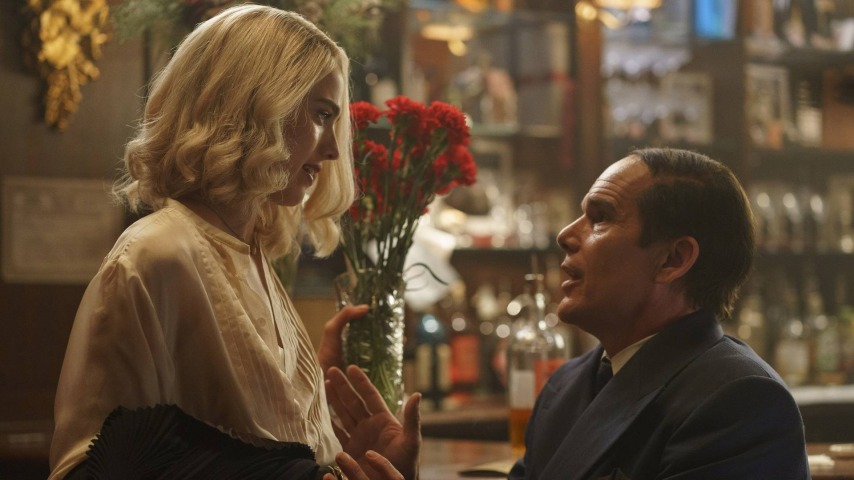Filmmakers looking to make a quick buck might present the genesis of the legendary creative partnership between composer Richard Rodgers and lyricist Oscar Hammerstein II on the 1943 opening night of Oklahoma! on Broadway from the perspectives of the partners themselves in order to chase upbeat feelings of triumph from a glamorous bygone era. Surely Rodgers and Hammerstein overcame many difficult challenges on the road to getting their hit show on the stage, and Hollywood loves a success story like theirs. Thankfully, Blue Moon director Richard Linklater and screenwriter Robert Kaplow are not those filmmakers.
In Blue Moon, Linklater and Kaplow realize that nostalgia, like whiskey, is at once a warming balm and a poison. They know that when looking back on times gone by, the far more compelling story lies in the perspectives of the troubled souls left behind by the very culture that once loved them.
In this case, that perspective belongs to lyricist Lorenz “Larry” Hart (Ethan Hawke), a Jewish, 48-year-old New York native who self-describes as having gone “directly from childhood to washed up.” Hart is former creative partner of Rodgers (Andrew Scott); together, the two put on some of America’s most cherished musical comedies, but on its first night, it’s already become clear that the popularity of Oklahoma! will eclipse anything that they made together, including their number one hit, “Blue Moon.” Hart can’t rush out of the Oklahoma! premiere fast enough, becoming the first attendee to down whiskey shots at Sardi’s, the century-old Theater District restaurant famously featuring walls lined with hand-drawn celebrity caricatures. Sardi’s is not only a longstanding Broadway institution and afterparty location, it’s also the sole location for the rest of Linklater’s Blue Moon, contributing to claustrophobic feelings on all sides. Hart can’t escape the smell of his own irrelevance, the cheerful partygoers can’t escape Hart, and the audience has no choice but to watch this all unfold in a single place.
Hart—a short alcoholic with an acerbic wit, thinning combover, and fabulously “ambiguous” sexuality—Hart is demonstrably bitter over the Rodgers break-up and the composer’s honeymoon phase with someone new. Even as Hart tries his best to keep the mood light by playfully chatting up Eddie the bartender (Bobby Cannavale) and Morty “Knuckles” Rifkin the pianist (Jonah Lees), the immense weight of Rodgers’ perceived betrayal is clearly dragging him down. The more desperate Hart is to disguise his emotional wounds, the more visible those wounds become, especially as Eddie continues to pour.
The next guest to arrive is the dazzling young Yale student Elizabeth Weiland (Margaret Qualley), a child of the theater with ambitions for a career in art direction and the current apple of Hart’s eye. He makes sexually suggestive comments about Elizabeth to Eddie and Knuckles behind her back, but the emptiness of these claims is painfully obvious to everyone except Hart. Elizabeth is genuinely fond of Hart too, but in the way one is fond of an old drunk uncle, not a sexy older mentor, as he sees himself. Plus, one of her eyes is always on the door, in case Rodgers walks in, and Hart is completely blind to this. Qualley plays her scenes so that Elizabeth is neither conniving, nor a dummy. Kaplow (reuniting with Linklater after the filmmaker adapted his novel Me And Orson Welles) based the screenplay for Blue Moon on written correspondence between Weiland and Hart, which seems to be the only reason for Qualley’s character to eat up so much screentime. The only real erotic moment comes when Hart follows the young male pianist into the bathroom, but Linklater breezes right past it.
When the men of the hour finally do make their entrance at Sardi’s, Rodgers immediately calls bullshit on Hart’s claims of sobriety. “Feeling healthy?” Rodgers repeatedly asks his former partner. Rodgers isn’t mocking Hart, but he already knows the answer. Alcoholics, as well as anyone who has ever loved an alcoholic, will recognize the obvious look in Scott’s eyes, silently reflecting a mix of sadness, anger, and acceptance, all blurred by Hart’s whiskey goggles. Hart hasn’t simply had too much to drink on this one occasion; this is a pattern that has played out one too many times for Rodgers to stick around. One gets the sense of watching a divorced couple exchanging veiled barbs at the more successful one’s second wedding. There’s nothing for the new wife Hammerstein (Simon Delaney) to do, except whisk Rodgers away from Hart at every chance he gets.
While Andrew Scott is perfect for Richard Rodgers, the first ever EGOT winner, one has to wonder why Ethan Hawke was chosen to portray a caustic Jewish homosexual who stood under five feet. Fran Leibowitz seems to be a more logical choice. Though this can seem like a quibble, the cheated blocking Linklater uses to make Hawke look comically shorter than Scott distracts from some truly great writing. The foppish hair piece isn’t too helpful, either. Hawke is visibly enjoying himself in the role, but one can’t help but think that there’s an undiscovered actor out there (one who isn’t best pals with Linklater) who is half Hawke’s size, but could deliver lines like, “I’m always serious, that’s why people think I’m so funny,” with twice the poison.
Director: Richard Linklater
Writer: Robert Kaplow
Starring: Ethan Hawke, Andrew Scott, Margaret Qualley, Bobby Cannavale, Jonah Lees
Release Date: February 18, 2025 (Berlin Film Festival)
